Taking Stock of Climate Progress
Air Date: Week of June 2, 2023
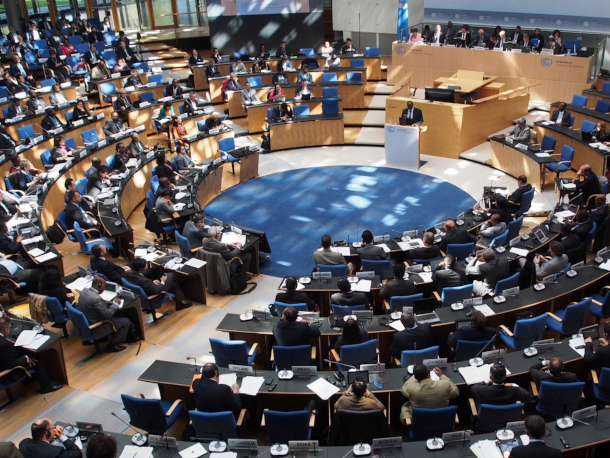
The U.N. climate change conference in Bonn, Germany, will kick off on June 5th. Above, a session takes place at the Bonn headquarters of the U.N. Framework Convention on Climate Change. (Photo: Shubert Ciencia, Flickr, CC BY-NC 2.0)
Delegates gather starting June 5 in Bonn, Germany to discuss loss and damage for vulnerable countries and progress under the 2015 Paris Climate Agreement, key issues leading up to COP28 in Dubai later this fall. David Waskow of the World Resources Institute joins Host Jenni Doering to give a preview of the agenda at Bonn and the controversy over the incoming COP28 President, an oil executive.
Transcript
CURWOOD: It’s Living on Earth, I’m Steve Curwood.
DOERING: And I’m Jenni Doering.
Delegates gather starting June 5th in Bonn, Germany, to prepare for COP28, the annual UN climate treaty meeting in Dubai in late fall. The topics include loss and damage for vulnerable countries and progress under the 2015 Paris Climate Agreement. But there’s controversy about the host country’s chosen President of COP28, Sultan Al Jaber, chief of the UAE state oil company.
BOEVE: It's like appointing the head of Smirnoff to an Alcoholics Anonymous meeting. [LAUGHS] Who are we kidding here, you know?
DOERING: That was May Boeve of 350.org when we spoke to her back in January. In recent weeks some members of Congress and the European Parliament have also pressed for Sultan Al Jaber to step aside. David Waskow is Director of the International Climate Initiative at the World Resources Institute, and he’s here to give us a preview of the agenda at Bonn. Welcome back to Living on Earth!
WASKOW: Great to be with you.
DOERING: So why are these talks in Bonn, Germany, so important?
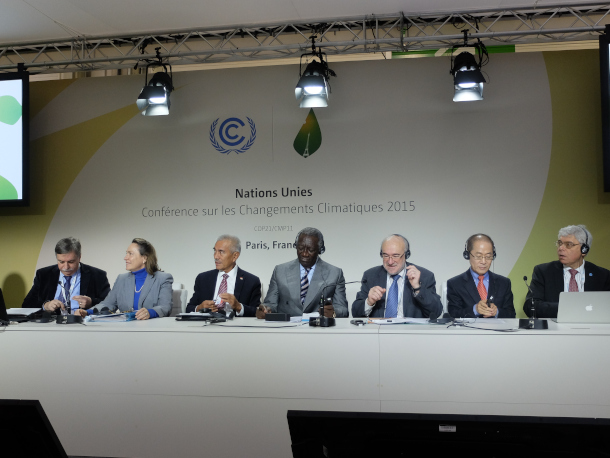
Delegates to the June conference will continue working on the first “global stocktake,” which will evaluate the world’s action on climate change and consider pathways for the future. The stocktake is part of the Paris Agreement, adopted at the COP 21 talks in 2015. (Photo: World Meteorological Organization, Flickr, CC BY-NC-ND 2.0)
WASKOW: Well, this year is an interesting and important year, because it is the first time that we're having what's called the global stocktake in the UN climate negotiations. That's something that came out of the Paris Agreement and it's part of a process every five years to increase the level of action, strengthen the kinds of action that countries are taking on climate change. And this leads up to a point in 2025, when countries are supposed to come forward with new commitments. But it also can be a point to really generate and mobilize greater action, stronger action. The “stocktake” name suggests that it's an assessment, and it is in part an assessment. And we heard from the Intergovernmental Panel on Climate Change a couple of months ago, how serious and dire in many ways the situation is. That as things stand, if we continue on our current course, we'll probably bust through the iconic limit of 1.5 degrees Celsius in the early 2030s. And so that's a key part of the assessment is to understand where we are. But this isn't only an assessment. This is a moment that also has to be a global springboard and really carry us forward to do the fundamental change that we need in order to keep temperature change at the levels that are needed so that we can avoid impacts that are essentially calamitous, at the very least extremely dangerous.
DOERING: Well, David, there have been growing calls from members of the US Congress and European Parliament for the United Arab Emirates to replace its pick to lead COP28. Sultan Al Jaber is their pick, and he's CEO of the UAE's state oil company, which basically means a fossil fuel executive would be leading the world's major conference to deal with climate change. So how does that line up with this global stocktake and the ambition that's needed? And what do you think the UAE presidency needs to do to regain credibility at these talks?
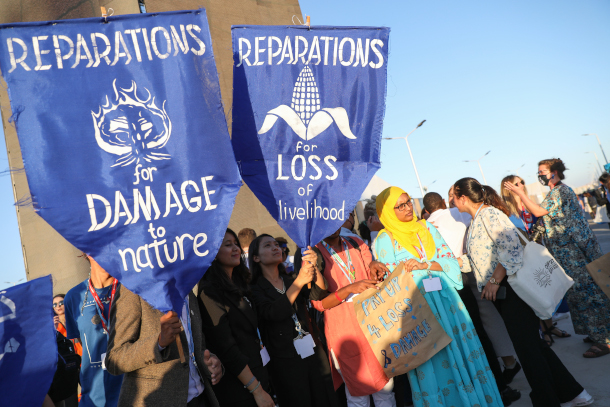
Delegates to the COP 27 talks in 2022 established a Loss and Damage Fund, with the aim of repaying vulnerable countries harmed by climate change – but Waskow says agreeing to set up the fund is only the first step in achieving that goal. (Photo: UNclimatechange, Flickr, CC BY-NC-SA 2.0)
WASKOW: So rather than focus on personalities, I think it's critically important to focus on substance. And it's clear that fossil fuels and the direction we take on fossil fuels will in fact be very central to this COP at the end of the year. What we clearly need to do as a world is to rapidly and equitably transition away from fossil fuels. And we need to also pursue the other options that we clearly have at hand, that includes ramping up renewables. And the International Energy Agency has said that by 2030, so just seven years from now, there needs to be a ratio of nine times more clean energy investment than dirty energy investment. We're not nearly there, we're maybe hovering around a little bit over parity, a little bit more clean energy than dirty energy investment. We are starting to see, and I think, in fact, the UAE Government has said that it supports, the notion that we need to triple renewable energy by 2030. And that's a big deal. That would be a lot of additional renewables. Those are the kinds of things that we need to see out of this COP. It's countries coming together to say we are going to pursue those transitions rapidly away from fossil fuel use and production. That is something that many countries have already indicated their support for, certainly many of the most vulnerable countries around the world have done so. And that now needs to be translated into the kind of results we want to see out of this negotiation.
DOERING: Well, the United Arab Emirates, which is hosting the next COP 28, this fall, they are a major fossil fuel-producing country. So what have they signaled about how they're feeling about this plan to phase the world off of fossil fuels?
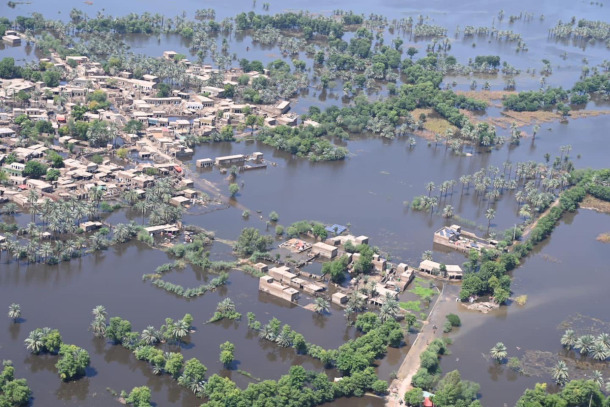
The Intergovernmental Panel on Climate Change has made clear that climate hazards will be significantly more severe at 2°C of warming than at 1.5°C. Above, the aftermath of heavy monsoon rains in Sindh, Pakistan. (Photo: Ali Hyder Junejo, Flickr, CC BY 2.0)
WASKOW: Well, they have said that they want to phase out fossil fuel emissions. I think that the reality with that is that although they may be thinking largely, or partly at least, in terms of carbon capture and storage, at the end of the day to actually achieve what they've said requires us to transition rapidly away from fossil fuel use. So that's where they stand. Just on the presidency, the COP presidency in general, the role of the presidency really needs to be, I would say two things. One is to create the space for a real open and fair conversation on these issues. The other is to also make sure that we're aiming for the highest ambition possible, that we really are trying to strengthen action as much as possible and moving in that direction. So those are the two tasks of this or any COP presidency, and the test is in how this moves forward. And it's really an issue of substance, I think and how the COP presidency actually goes about its work.
DOERING: One of the key topics at COP 27 in Egypt last year was loss and damage. How big of a focus do you think loss and damage will be at Bonn?
WASKOW: Last year, we did have an important decision on creating a fund on loss and damage to support countries who are facing conditions, climate impacts, that they can't adapt to. That was the first step. And we're now seeing a process to set up a fund and funding arrangements. That will continue, there's sort of a separate stream of a process. But at this upcoming COP, we very much need to see that fund put into operation. Countries are already bearing these impacts. I mean, we see it even in the United States. And then imagine if you're in a small island country, or you're in a least developed country, what the impacts are and what the implications are. And that's only going to grow over time. And so we can't step away from that reality. This is what it ultimately is all about, is what happens to people, what happens to ecosystems. And so we really do need to continue to press forward on this loss and damage front. We also need to take action to build resilience and enable communities to adapt to the climate impacts that they're facing, so that the loss and damage is actually reduced to some degree. There is a lot that can't be adapted to, that we can't build resilience to. But where we can, we need to really resource that. And that, that has been a little bit on the sidelines recently, but I think needs to come very much back to the forefront.
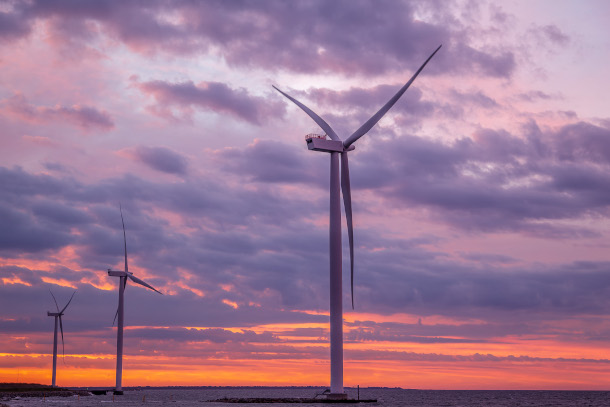
To achieve an energy sector with net-zero carbon dioxide emissions by 2050, the world needs to more than triple its yearly investment in clean energy by 2030, according to the International Energy Agency. (Photo: kboul, Flickr, CC BY-NC 2.0)
DOERING: Can you give us any insight into the overall mood of delegates going into these talks in Bonn, Germany, starting June 5th?
WASKOW: Well, I think the world right now is in a lot of flux. We're seeing that with the war in Ukraine. We're seeing that with relations among other governments, US and China, for example. And at the same time, the world is in flux in other ways. We are seeing a significant ramping up of renewable energy, a real shift in terms of the growth of electric vehicles. So I think the world is sort of shifting under our feet. We're also seeing increasing climate impacts. So things are very much in flux. And I think that is really the context in which we are entering these negotiations and exactly how and even whether countries and negotiators are going to be able to put their hands around some concrete takeaways. That's the issue in the midst of all of this flux.
DOERING: David Waskow is director of the International Climate Initiative at the World Resources Institute. Thank you so much, David.
WASKOW: Thank you. It was terrific to be with you.
DOERING: And safe travels to Bonn next week.
WASKOW: Yes, thank you so much.
Links
Read about the upcoming conference in Bonn
Learn more about the “global stocktake”
Living on Earth wants to hear from you!
Living on Earth
62 Calef Highway, Suite 212
Lee, NH 03861
Telephone: 617-287-4121
E-mail: comments@loe.org
Newsletter [Click here]
Donate to Living on Earth!
Living on Earth is an independent media program and relies entirely on contributions from listeners and institutions supporting public service. Please donate now to preserve an independent environmental voice.
NewsletterLiving on Earth offers a weekly delivery of the show's rundown to your mailbox. Sign up for our newsletter today!
 Sailors For The Sea: Be the change you want to sea.
Sailors For The Sea: Be the change you want to sea.
 The Grantham Foundation for the Protection of the Environment: Committed to protecting and improving the health of the global environment.
The Grantham Foundation for the Protection of the Environment: Committed to protecting and improving the health of the global environment.
 Contribute to Living on Earth and receive, as our gift to you, an archival print of one of Mark Seth Lender's extraordinary wildlife photographs. Follow the link to see Mark's current collection of photographs.
Contribute to Living on Earth and receive, as our gift to you, an archival print of one of Mark Seth Lender's extraordinary wildlife photographs. Follow the link to see Mark's current collection of photographs.
 Buy a signed copy of Mark Seth Lender's book Smeagull the Seagull & support Living on Earth
Buy a signed copy of Mark Seth Lender's book Smeagull the Seagull & support Living on Earth

